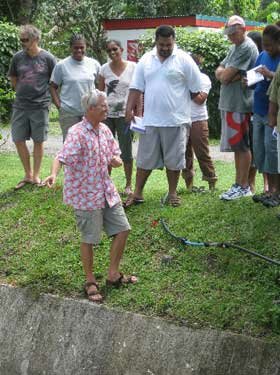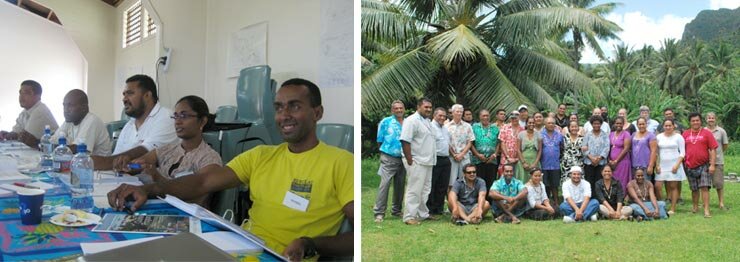 |
Geoff Dews, University of Queensland, advises EBM course participants on drainage issues
|
The goal of the two-week course was to facilitate on-ground management of coastal and marine resources using the EBM approach. Twenty-six participants from 10 Pacific Island countries learned about various approaches, tools and techniques in planning and implementing an EBM approach in the management and use of their natural resources.
Geoff Dews, University of Queensland, advises EBM course participants on drainage issues
he course covered both the theoretical and practical aspects of EBM, including consideration of case studies - in particular, what has been done to improve the health of the Cook Islands’ Takitumu Lagoon.
The hands-on approach equipped participants with the confidence, knowledge and tools to initiate and apply effective EBM on their own islands.
“Through the course, participants were able to integrate their prior learning about different sectors, as well as bring theory into practice,” said course coordinator Geoff Dews from the University of Queensland.
There is still a way to go for Pacific Island countries to gain the full benefits the EBM approach offers, according to Dews.
“There was recognition that good management tools such as regulation and legislation already exist, but they are not being fully utilised and enforcement is an issue.
“It was also clear that there will be some local barriers to implementation of the EBM approach, primarily institutional arrangements. For example, different government departments may not be used to working with one another or may not have the resources to do so.
“However, participants were very enthusiastic about the application of EBM to address the issues they face every day. They were also appreciative of the professional development opportunity as it recognised their own experience and skills.”
During the course, participants were encouraged to develop EBM frameworks for projects they were already working on, ready for immediate use in their home countries. These local projects addressed the grass roots issues of coastal water quality, environmental impact, management of land use and development, and local community engagement in EBM.
“The projects demonstrated that the EBM principles were understood and can be applied to address on-ground issues,” said Geoff Dews.
Another key benefit of the EBM course was the joint learning opportunities and the networks created across the Pacific.
“One of the challenges Pacific Island resource managers face is working individually,” said course participant Saras Sharma, a fisheries research officer with Fiji’s Department of Fisheries.
“By working together, we can learn what others have done - we don’t have to all make the same mistakes.”
